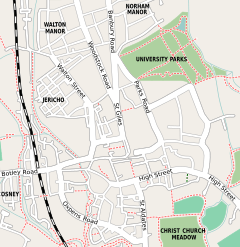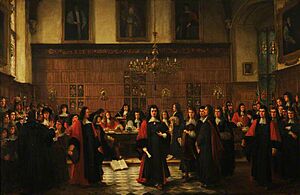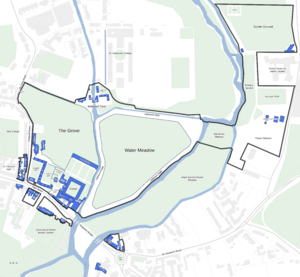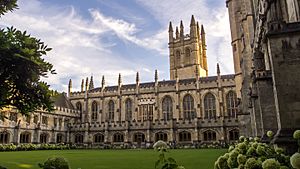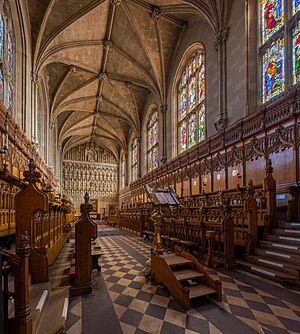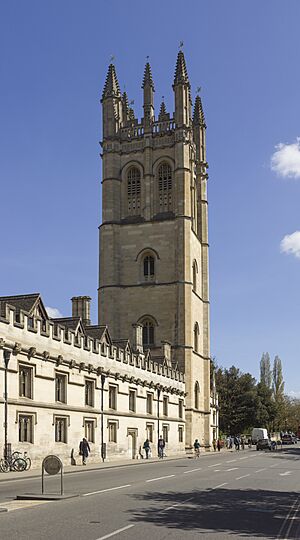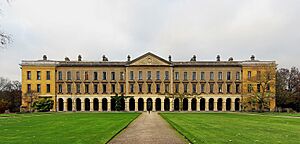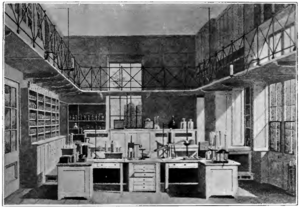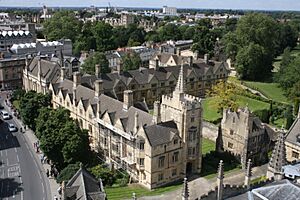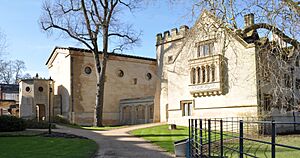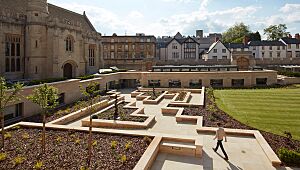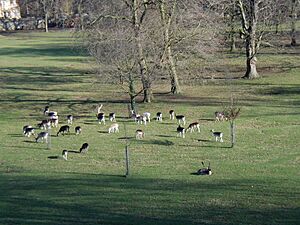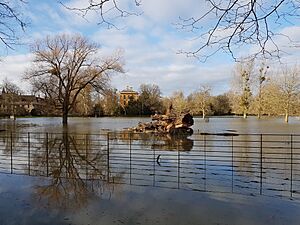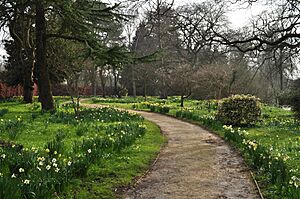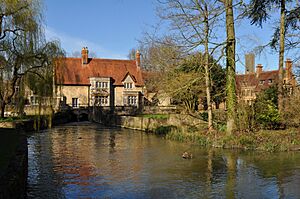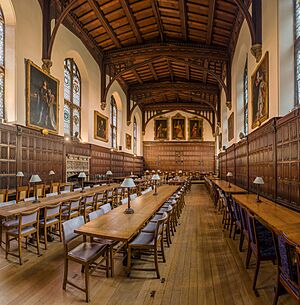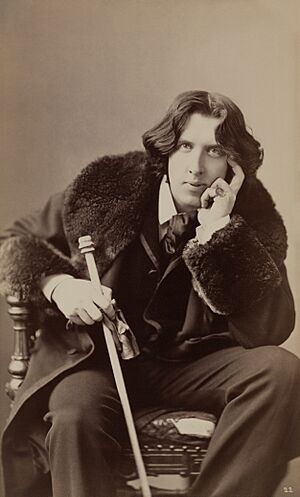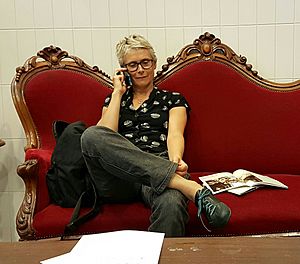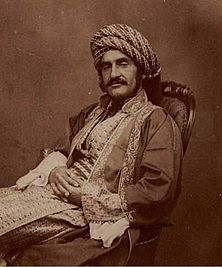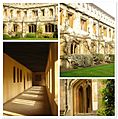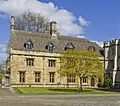Magdalen College, Oxford facts for kids
Quick facts for kids Magdalen College |
||||||
|---|---|---|---|---|---|---|
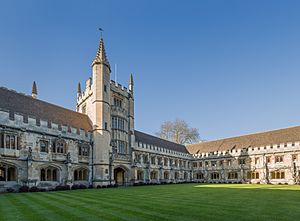
The Cloister and Founders’ Tower
|
||||||
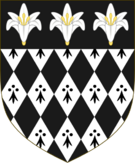
Blazon: Lozengy ermine and sable, on a chief of the second three lilies argent slipped and seeded or
|
||||||
|
|
||||||
| University | Oxford | |||||
| Location | Longwall Street and High Street | |||||
| Coordinates | 51°45′09″N 1°14′49″W / 51.752374°N 1.247077°W | |||||
| Full name | The College of St Mary Magdalen in the University of Oxford | |||||
| Latin name | Collegium Beatae Mariae Magdalenae | |||||
| Motto | Floreat Magdalena | |||||
| Established | 1458 | |||||
| Named for | Mary Magdalene | |||||
| Sister college | Magdalene College, Cambridge | |||||
| President | Dinah Rose | |||||
| Undergraduates | 390 (2018) | |||||
| Postgraduates | 178 (2018) | |||||
| Boat club | Magdalen College Boat Club | |||||
| Map | ||||||
Magdalen College (pronounced MAWD-lin) is one of the colleges that make up the University of Oxford. It was started in 1458 by William Waynflete, who was a bishop and a very important person in England at the time.
Magdalen is known for being one of the richest and best colleges in Oxford for studies. It has even set records for high academic scores. The college is home to many important professors.
A famous part of the college is the large, square Magdalen Tower. It's an important landmark in Oxford. Every year on May Morning, the college choir sings from the top of the tower at 6 AM. This tradition dates back to the time of King Henry VII. The college is located next to the River Cherwell and the University of Oxford Botanic Garden. Inside its grounds, you can find a deer park and a famous path called Addison's Walk.
Contents
College History
How Magdalen College Started
Magdalen College was founded in 1458 by William Waynflete, who was the Bishop of Winchester and the Lord Chancellor of England. He named it after Mary Magdalene. Before the college, Waynflete had started a university hall called Magdalen Hall in 1448. Many of the first students for the new college came from this hall.
Waynflete also started a school, which is now Magdalen College School, Oxford. It's a private school located near the college, across the Cherwell River. A rich man named Sir John Fastolf also helped by leaving a lot of money to fund the college.
Magdalen College was built on the site of an old hospital called St John the Baptist Hospital, next to the River Cherwell. The college used the hospital buildings at first, until new ones were finished between 1470 and 1480. When it first started in 1458, the college had a president and six scholars. By 1487, it had grown to include a President, 40 fellows, 30 scholars (called demies), priests, clerks, and 16 choristers.
The college's rules included having a choir of men and boys, a tradition that still continues today. The name of the college is pronounced Maudlin because that's how Mary Magdalene's name was said in late medieval English.
Magdalen College During the English Civil War
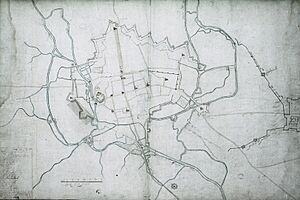
During the English Civil War, Oxford and Magdalen College supported the King's side, known as the Royalists. In 1642, Magdalen College gave over 296 pounds of silver and gold items to help pay for the war. This was the largest donation from any Oxford college.
Magdalen College was important for the King's army because it was on the banks of the Cherwell River. It overlooked Magdalen Bridge and the road from London. From 1643 to 1645, the college's grounds were used by the Royalist army. Prince Rupert of the Rhine is thought to have stayed at the college.
The city built strong defences through Magdalen's grounds to prepare for attacks. One of these was Dover's Speare, a lookout point. You can still see the earthworks where it was located today. During the first Siege of Oxford, King Charles I of England watched the battle from Magdalen Tower.
After Oxford surrendered to Thomas Fairfax, the Parliament ordered changes in Oxford to remove people who supported the King. In 1647, Magdalen's president, John Oliver, was removed. Many fellows and scholars were also expelled. The college then hosted Fairfax and Oliver Cromwell in 1649.
When the King returned to power in 1660, John Oliver and many of the expelled fellows and scholars were allowed to come back to the college.
Expulsion of the Fellows
In the 1680s, King James II of England tried to bring Catholicism back into the university, which was then Anglican. In 1687, he tried to make Anthony Farmer the president of Magdalen. The college fellows said no. Farmer was not a fellow of the college, and the rules said the president had to be one. The fellows chose John Hough instead.
King James then offered a different person, Bishop Samuel Parker, but the fellows still refused. Parker was forced into the role, and the fellows and scholars who had stood up to the King were expelled. They were replaced by people chosen by the King, who were either Catholic or moderate Anglicans.
This event showed how strong the university's Anglican beliefs were. It also made many Anglicans angry at King James, seeing his actions as bossy. On October 25, 1688, just before the Glorious Revolution (when James II was overthrown), the King's changes were undone. Hough and the expelled fellows were brought back to the college. This event is still celebrated every year with a special dinner.
Magdalen College in the 20th and 21st Centuries
Magdalen became very well-known in the mid-1900s because of famous fellows like C. S. Lewis and A. J. P. Taylor. During World War II, the Royal Air Force's Maintenance Command was based at Magdalen.
Magdalen College owns and manages the Oxford Science Park, a large park for science and technology companies. The college became the full owner of the park in 2016. In 2021, it sold 40% of its share for £160 million. This sale is expected to make Magdalen "probably the richest of Oxford's 39 colleges."
Like many Oxford colleges, Magdalen started accepting both male and female students in 1979. Before that, it had been a men-only college for over 500 years.
College Buildings
The college grounds are very large. They include many different styles of buildings. People have described the college as having an "old medieval centre with two newer parts added later."
The college has five main courtyards, called quads. St John's Quad is the first one you see when you enter. It has the Outdoor Pulpit and the old Grammar Hall. It connects to the Great Quad (the Cloister) through the Founders Tower. This tower is beautifully decorated with carvings. The Chaplain's Quad is next to the Chapel and Hall. St Swithun's Quad and Longwall Quad were built later, in the late 1800s and early 1900s.
Original Buildings
The college was built on the site of St John the Baptist Hospital. Some of the hospital buildings were used by the college. For example, the old kitchens are now the college bar, called the Old Kitchen Bar.
New construction started in 1470. The chapel, hall, and the cloister were built around 1480.
The Cloister
The Cloister, or Great Quad, is the oldest part of the college. It was built between 1474 and 1480. You can get to the Cloister from St John's Quad through the Founders Tower. The chapel and the hall are on the south side of this quad. It also has common rooms for students and the old library.
In 1508, strange carvings called hieroglyphics were added to the Cloister. These carvings are thought to represent ideas. For example, some carvings in front of the old library show subjects like science, medicine, law, and religion. Other carvings represent good qualities, like courage, or bad ones, like pride.
In 1822, part of the Cloister was taken down for repairs, but it was rebuilt soon after. In the early 1900s, more renovations were done to make it look more medieval. In the 1980s, student rooms were added in the large roof space.
The Chapel
The chapel is a place of worship for college members and others. Services are held daily during term time. The choir sings Choral Evensong every day except Mondays. On Sundays, a Sung Eucharist is held in the morning.
The chapel building itself is very old and important. It was built between 1474 and 1480. However, it looks the way it does today mostly because of changes made in the 1700s and 1800s to make it look more Gothic.
- Ceiling
The ceiling looks like it's made of stone, but it's actually made of plaster. It was added in 1790 by an architect named James Wyatt.
- Altar Wall
After 1662, a painting of the Last Judgement was placed at the east end. This painting was removed in the 1830s. Behind it, parts of the original altar wall (reredos) were found. These showed that the original wall had many small spaces for statues. The current altar wall was then built based on these findings. It was filled with figures by a sculptor named Thomas Earp in 1864.
- Stained Glass Windows
The stained glass windows facing St John's Quad show a picture of the Last Judgement. These windows are from 1792. They were taken down during World War II to keep them safe and put back in the 1990s.
Magdalen Tower
Building Magdalen's Great Tower started in 1492. It was finished in 1509. The tower has ten bells that are used for English change ringing. The heaviest bell was made in 1623.
The tower is 144 feet tall and is a very noticeable building when you enter the city centre from the east. It has been used as a model for other towers around the world. The tower is central to the May Morning celebrations in Oxford, where the choir sings from its top.
The New Building
In the 1700s and 1800s, there were many plans to change the college layout. The New Building started being built in 1733. It is in a Palladian style, which is a classical style, and has a colonnade (a row of columns).
This building was meant to be one side of a new large courtyard, but the full plan was never completed. Other architects later tried to finish the design, but it never happened.
Finally, in 1824, the ends of the building were finished. Today, it stands away from the Cloister. It looks out over croquet lawns on one side and the deer park on the other. It is used for student and fellow accommodation. Famous people like Edward Gibbon and C. S. Lewis have lived there. It also has the college's wine cellar.
Daubeny Laboratory
Across from the main college, next to the University of Oxford Botanic Garden, is the 19th-century Daubeny Laboratory.
The Botanic Garden was started in the 1600s to study plants for medicine. The Daubeny Laboratory and the Professor's House were built by Charles Daubeny, a Magdalen fellow and a scientist, after he became the Professor of Botany in 1834.
Daubeny added new glasshouses and a home for the Professor of Botany. He also wanted a better science lab. He asked the college to build one, and the Daubeny Laboratory was finished in 1848. It became the main chemistry lab for the university. In 1902, it was changed into a lecture hall. In 1973, most of the building became accommodation for graduate students. The Daubeny lab itself is now a meeting space.
St Swithun's Quad
Between 1880 and 1884, the college expanded westwards. This new area, called St Swithun's Quad, was designed in the Gothic style. In 1928, the building was extended, forming the nearby Longwall Quad.
Modern Buildings
Several new buildings were added in the late 1900s. The Waynflete Building was completed in 1964. Magdalen also has other buildings nearby for student accommodation.
The Grove Buildings were built between 1994 and 1999. They have student rooms, Magdalen's 160-seat auditorium, and the Denning Law Library. The Magdalen Film Society shows movies in the auditorium during term time.
Along Addison's Walk is the Holywell Ford site, where most graduate students live. Holywell Ford house was built in 1888 and bought by Magdalen in the 1970s. More student rooms were built there in 1994-1995.
College Libraries
Besides the university's main libraries, Oxford colleges have their own. The original college library, the Old Library, is in the Cloister. It has many old manuscripts from before the 1800s. You can usually visit it by appointment or during special exhibitions.
In 1931, the New Library, now called the Longwall Library, was created. It became the college's main library for students. It was renovated between 2014 and 2016 and reopened by Prince William.
The college also has the Denning Law Library for law students. There are also special collections like the Daubeny and McFarlane libraries, which have old science and medieval history books.
College Grounds
The Grove (Deer Park)
The Grove, also known as the deer park, is a large grassy area that takes up most of the north-west part of the college grounds. In winter and spring, it is home to a herd of fallow deer. You can see the deer from paths and from the New Building.
In the 1500s, the Grove had formal gardens, tree-lined paths, and a fish pond. By the 1600s, a bowling green was added.
During the English Civil War, the Grove was used for army workshops. After the war, it became more like a natural park. Deer started to be kept in the college in the 1720s. By the early 1800s, the formal gardens were gone, and the whole Grove was used for the deer.
Water Meadow and Addison's Walk
The water meadow is a flood-meadow on the eastern side of the college. It is surrounded by the River Cherwell. In wet winters, parts of the meadow might flood. All around the edge of the meadow is a path lined with trees, called Addison's Walk. It is named after a former fellow, Joseph Addison. This path connects to Holywell Ford and the Fellows' Garden.
Addison's Walk is popular with students and visitors. C. S. Lewis wrote a poem about the walk, which is remembered on a plaque near the gate to Holywell Ford.
Because it floods often, the meadow is one of the few places in the UK where the snake's head fritillary flower can be seen growing wild. These rare flowers have been recorded in the meadow since about 1785. After the flowers bloom, the deer herd is moved into the meadow for the summer and autumn.
Bat Willow Meadow and the Fellows' Garden
Further east of the water meadow are Bat Willow Meadow and the Fellows' Garden. They are separated by other parts of the Cherwell River. You can reach them from Addison's Walk. Bat Willow Meadow has a 10-meter-high sculpture of a branching tree called Y by Mark Wallinger. It was made for the college's 550th anniversary in 2008. The willow trees in this meadow were cut down in 2018 and replanted, and their wood was used to make cricket bats.
The Fellows' Garden is further north along the Cherwell River. This long, narrow garden follows the river to the edge of the University Parks.
Magdalen College Choir
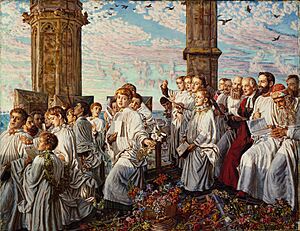
Magdalen is one of three colleges in Oxford that have a choir as part of their original rules. The other two are New College and Christ Church. The choir performs during chapel services and other special events. As part of Oxford's yearly May Morning tradition, the choir sings from the top of Magdalen's Tower at 6 AM on May 1st. This tradition is over 500 years old.
The choir has twelve student singers (called academical clerks or choral scholars) and two organ scholars, who are also students. It also has sixteen choristers, who are boys with scholarships at Magdalen College School, Oxford. The choir is led by a director of music.
Many famous musicians have been part of the Magdalen choir. These include singers like John Mark Ainsley and Roderick Williams, and conductors like Harry Christophers. Famous organists have also been part of the college, such as John Stainer and the comedian and jazz musician Dudley Moore.
Besides performing in chapel, the choir also goes on tours and records music. In 2005, the choir was nominated for a Grammy Award for its CD of music by Orlando Gibbons. They have also worked on music for the BBC's The Blue Planet and Paul McCartney's classical piece Ecce Cor Meum.
Student Life at Magdalen
Accommodation for Students
Undergraduate students at Magdalen are guaranteed a place to live in college buildings for their entire degree. First-year students usually live in the Waynflete building. In later years, they live in rooms within the older parts of the college, like the Cloister or the New Building. Graduate students are guaranteed at least two years of accommodation. They usually live in buildings outside the main college walls, like Holywell Ford.
Accommodation costs include heating, electricity, internet, and weekly cleaning by the college housekeepers. Food is not included, but three cafeteria-style meals are served daily in the hall. Other food is available at the Old Kitchen Bar.
In addition to daily meals, four special dinners called Formal Halls are held each week during term time. These are three-course sit-down dinners where college members wear their gowns. There are also extra banquets for special occasions.
Events and Societies
Undergraduate and graduate students have their own groups called the Junior Common Room (JCR) and Middle Common Room (MCR). These groups elect student committees each year to plan social events and banquets.
Magdalen students can also join several college societies, in addition to university-wide clubs. The Atkin Society is for law students, and the Sherrington Society is for medicine students. They organize talks and social events. The college also has a poetry group called the Florio Society.
Other societies include the Magdalen Players (a drama group), the Magdalen Music Society, and the Magdalen Film Society. The Music Society has a choir and an orchestra, and they perform concerts in college.
The Magdalen College Trust is a charity that encourages students and fellows to do charity work and helps fund good causes.
Academic Success
Magdalen has a strong academic record. In the Norrington Table, which ranks Oxford colleges by academic results, Magdalen has been first three times (in 2010, 2012, and 2015). In 2010, over half of its final-year students achieved top grades, setting a record. Magdalen has the second-highest average score in the Norrington Table from 2006 to 2019.
Magdalen College students have also done very well in the University Challenge TV competition, winning four times (1997, 1998, 2004, and 2011). This is the joint highest number of wins for any institution.
Unlike most other colleges, students who receive a scholarship at Magdalen are called Demies.
Sports at Magdalen
Magdalen students have access to many sports facilities. The Magdalen College Recreation Ground has pitches for cricket, soccer, hockey, and rugby. There are also tennis courts and squash courts. The college also pays for all its students to have gym memberships at the Iffley Road sports complex.
The Magdalen College Boat Club (MCBC) is the college's rowing club, founded in 1859. It takes part in Oxford's two yearly rowing races, Eights Week and Torpids. Magdalen also has teams for football, hockey, rugby, netball, cricket, lacrosse, squash, and pool.
Notable People from Magdalen College
Politics
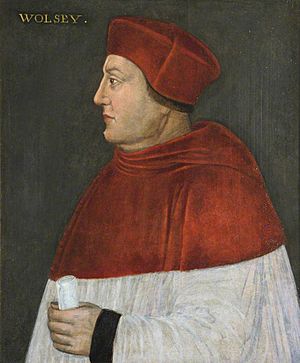
Magdalen College has educated members of several royal families. These include King Edward VIII, who attended from 1912 to 1914, and Jigme Khesar Namgyel Wangchuck, the king of Bhutan.
One important political figure from Magdalen was Cardinal Thomas Wolsey. He studied theology and graduated at 15, which was very young. He later became a fellow of Magdalen. Wolsey rose from a humble background to become the Lord Chancellor and the Archbishop of York. He gained great political power and was an adviser to King Henry VIII. Wolsey left a lasting mark on Oxford by founding Cardinal College, which King Henry VIII later completed and renamed Christ Church.
More recent Magdalen alumni who became politicians include Malcolm Fraser, a former Prime Minister of Australia, and John Turner, a former Prime Minister of Canada. Many members of the UK Parliament have also studied at Magdalen. In 2010, five out of 22 ministers in the UK government cabinet had attended Magdalen.
Arts
Literature
Joseph Addison, for whom Addison's Walk is named, was a Fellow of Magdalen in the 1600s. He is known for his play Cato, a Tragedy.
The 19th-century writer Oscar Wilde studied at Magdalen from 1874 to 1878. He won a university prize and graduated with top honours. After Magdalen, he became famous for his works like the novel The Picture of Dorian Gray and the play The Importance of Being Earnest. Wilde faced legal troubles related to his personal life. He once said, "the two great turning-points in my life were when my father sent me to Oxford, and when society sent me to prison." After leaving prison, Wilde moved to France and lived his last years in poverty.
C. S. Lewis, a famous writer, was a fellow and English tutor at Magdalen for 29 years (1925-1954). Lewis was part of the Inklings, an informal writing group that included J. R. R. Tolkien. They often met in Lewis's rooms at Magdalen. Lewis taught John Betjeman, who later became the Poet Laureate of the United Kingdom.
Seamus Heaney, who won the Nobel Prize in Literature in 1995, was a fellow of Magdalen from 1989 to 1994.
Theatre
The director Peter Brook is both an alumnus and an honorary fellow of Magdalen. He has been called "our greatest living theatre director." Director Katie Mitchell also studied English at Magdalen. She is known for her work in contemporary theatre and opera.
Music
In 1957, the organist and composer Bernard Rose became Magdalen's choir master. His students included Harry Christophers, a composer and director, and Dudley Moore, the comedic actor and jazz musician.
Andrew Lloyd Webber, the famous composer of musicals like Evita and The Phantom of the Opera, studied history at Magdalen for a short time in 1965 before leaving to pursue music. He has received many awards for his work.
Humanities
Hormuzd Rassam, an Assyriologist (someone who studies ancient Assyria), studied at Magdalen. He made several important discoveries. In 1853, he found the clay tablets that contained the Epic of Gilgamesh. In 1879, he discovered the Cyrus Cylinder. He was the first archaeologist from the Middle East, but his contributions were not always recognized by others at the time.
The economist A. Michael Spence attended Magdalen. In 2001, he shared the Nobel Memorial Prize in Economic Sciences for his work on markets where people have different amounts of information.
Philosopher A. C. Grayling studied at Magdalen. He is known for his views on religion and for founding the New College of the Humanities.
Sciences
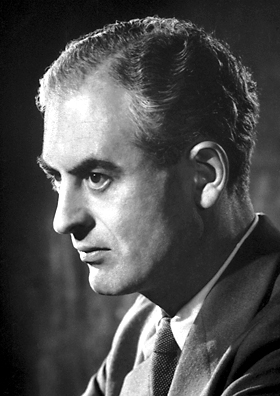
Magdalen has had several alumni who won the Nobel Prize in Physiology or Medicine. Howard Florey studied at Magdalen and shared the Nobel Prize in 1945 for developing penicillin. Peter Medawar also studied at Magdalen and later won the 1960 Nobel Prize for his research on tissue grafting, which helped make organ transplantation possible.
John Eccles, another Nobel Prize winner, also came to Magdalen. He won the Nobel Prize in 1963 for his research on synapses (connections between nerve cells).
Peter J. Ratcliffe was a professor at Magdalen and shared the 2019 Nobel Prize for his work on how cells sense oxygen.
Two Fellows of Magdalen have won the Nobel Prize in Physics: Erwin Schrödinger in 1933 and Anthony James Leggett in 2003.
Because of its close link with Oxford's Botanic Garden and its role as home to the Professor of Botany, Magdalen has been connected to many great botanists. These include Charles Daubeny, who founded the Daubeny laboratory.
Many distinguished scientists have also held important professorships at Magdalen. These include the mathematician J. H. C. Whitehead, known for his contributions to topology, and Daniel Quillen, who received the Fields Medal (a top award in mathematics).
Images for kids
-
View of the Great Tower from the Daubeny Laboratory, across the High.
-
Ancient Door, Magdalen College, Oxford by Henry Fox Talbot, circa 1843, showing the western door to the chapel beneath the window depicting the Last Judgment.
See also
 In Spanish: Magdalen College (Oxford) para niños
In Spanish: Magdalen College (Oxford) para niños
 | James B. Knighten |
 | Azellia White |
 | Willa Brown |


